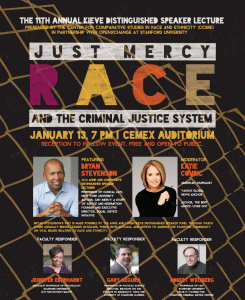Table of Contents
Last night, Bryan Stevenson, acclaimed public interest lawyer, sat with three Stanford faculty members at the OpenXChange event ‘Just Mercy: Race and the Criminal Justice System,’ moderated by Katie Couric. The event – the first of its kind in 2016 to encourage ‘meaningful interchange and thoughtful listening’ – was crowded with diverse attendees, including undergraduates, graduates, faculty members, and local residents. Cemex Auditorium quickly filled up, as did two overflow rooms. By one source, over 1,200 people registered attendance. The event, if nothing else, demonstrates OpenXChange’s ability to spark community interest. The next challenge for OpenXChange is to fulfill its mission of “purposeful engagement around national and global concern.” Unfortunately, last night demonstrated a lack of audience participation and uniformity of panel opinion.
The event consisted of a talk and a panel discussion. The former, hosted by Stevenson, was extremely powerful and moving. After starting with statistics that made several members of the audience gasp, such as the 640% increase of incarcerated women in recent years (70% of which were single mothers), he detailed the steps that American culture must take in order to reconcile and redeem itself from its troubled history of racism. The ideas were simple: In order to understand poverty, it is necessary to remain close to it. Never allow hope for improvement to be killed by cynicism. Be ready to expose yourself to uncomfortable truths. Each of these points were supported by powerful personal anecdotes and frightening statistics that moved several members of the audience to tears. The talk ended with a standing ovation, securing Stevenson’s talk as the epitome of OpenXChange’s mission: the effective spread of relevant ideas about pertinent issues of our time.
The panel, however, highlighted several weaknesses within OpenXChange. Perhaps it is merely a brand issue, but OpenXChange has been promoted as a venue for dialogue, and dialogue was lacking on stage. Every member of the panel was immensely educated, charismatic, and articulate, but to listen to the panel was to hear four people agree and a fifth person prompt them to continue agreeing with themselves. The event was an immense opportunity for debate on race in American culture, but the panel’s uniformity of opinions more nearly approximated a lecture than an exchange. Audience-submitted questions, the sole interactive component of the panel, were limited to two. Couric even joked that “my questions are significantly better than your questions.” This highlighted a vague disingenuity, in both OpenXChange and the panel, which was made even more glaringly obvious when the only query that temporarily stumped the panel was on how to properly conduct dialogue about race in the real world. After all the panelists had called for dialogue for over an hour, this question resulted in awkward silence. Finally, Gary Segura, a Stanford professor of political science, stated that one way to start a conversation was to tell a white person that they are advantaged because their grandparents were advantaged. No other option was seriously entertained.
This declaration of privilege is not necessarily wrong, but this proposal is disappointingly simple given both the expertise of the men and women on stage that night and the mission statement of OpenXChange itself. Stevenson mentioned during his talk that if there is not a cultural framework for dialogue about race to happen, then it will not happen. In his case, he said that plaques should be erected on the sites of lynchings and that men of uniform should apologize for law enforcement’s role in enforcing Jim Crow laws.
It is apparent from last night’s event that ‘dialogue’ risks taking the form of an educated and united few lecturing the uneducated many on the sins of their ancestors. This is the problem with OpenXChange: it threatens to promise dialogue and deliver lectures instead. It gives us plaques where it promised white boards. It cannot hope to “push our community for meaningful interchange” if it cannot even do so itself within its highest profile events. OpenXChange’s event was not an exchange; it was simply delivery.





